Tom Kepler's Blog, page 34
March 7, 2012
Book Review: Pride and Prejudice and Zombies, by Jane Austen and Seth Grahame-Smith
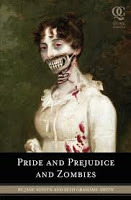 Having recently read Austen's Pride and Prejudice and reviewed it , I decided to buy a used copy of Pride and Prejudice and Zombies. (Actually, I used a gift coupon.) When the book arrived, the first thing I did was to make a cover from a brown paper sack. I just got tired of seeing that image--so I guess the book designer should feel complimented. It's gross.
Having recently read Austen's Pride and Prejudice and reviewed it , I decided to buy a used copy of Pride and Prejudice and Zombies. (Actually, I used a gift coupon.) When the book arrived, the first thing I did was to make a cover from a brown paper sack. I just got tired of seeing that image--so I guess the book designer should feel complimented. It's gross.Of course, it's supposed to be gross--that's the zombie way.
As far as I understand it, the zombie sub-genre of horror includes the following requirements:
graphic descriptions of zombies attacking in hordes, eating brainsviolent "offings" of many zombies utilizing martial arts, edged weapons, and firearmsa certain level of humor and poking fun at the whole process, and a clumsiness and stupidity in the zombiesthe threatened end to "life as we know it"I wasn't thrilled with Pride and Prejudice and Zombies--and not just because of the grossness. I knew that would be there, going in. There are some quite clever parts to this novel. Observing the five Bennet girls arrange themselves into the Pentagram of Death to fight their way out of the Netherfield dance was clever, and the girls taking their walks to Meryton, packing Brown Bessies (famous British army muskets of the era) and loaded for . . . zombies . . . had its own unexpected humor.
However, the charm began to fade as the novel progressed. I began to anticipate where references to zombies or fighting skills were going to be inserted--and found myself correct. The writing was beneath that of Austen and couldn't sustain its appeal.
I finally put the book down for a while because it seemed that the plotline was virtually the same as the original novel, except comments were added at appropriate points regarding how many "kills" a character had attained or some comment about fighting strategies. I got to where I could anticipate when a zombie comment would be made and how it was phrased--and was accurate too often. The story became predictable.
The story did diverge in three main areas, though, and this allowed me to finish the novel, albeit with a lot of skimming. The main divergences began when Elizabeth visited the Collinses at the vicarage at Rosings.
The Mr. Collins and Charlotte Lucas relationship was significantly changed.The Mr. Wickham and Lydia Bennet relationship was quite different.The Right Honourable Lady Catherine de Bourgh has a significantly different role in the novel.I supposed since I had to skim significant portions of the novel to finish it that I cannot recommend it more than "Two Stars." Someone who has never read Austen's Pride and Prejudice may enjoy the novel more, being unaware of how much zombie information was just stuck into the novel.
Ultimately, Pride and Prejudice and Zombies just wasn't clever or elegant enough. But, of course, zombie novels are supposed to be clever or elegant.
Copyright 2012 by Thomas L. Kepler, all rights reserved
Published on March 07, 2012 09:19
March 3, 2012
Book Review: The Cossacks by Leo Tolstoy
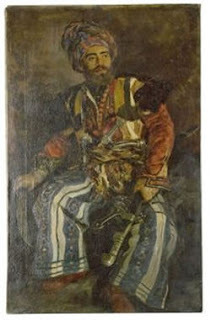 Portrait of a Cossack by Alexander LitovchenkoThis novel was read as a free e-book.
Portrait of a Cossack by Alexander LitovchenkoThis novel was read as a free e-book. Tolstoy's stories of the Cossacks are the Russian version of America's Western novel genre with cowboys and Indians. The Cossacks , being written by Leo Tolstoy, becomes much more, of course.
Tolstoy's short novel is about a young Russian aristocrat, Dmitri Olenin, who leaves Moscow, disillusioned with Moscow society and with love. He joins the army as a cadet, yet still maintains a special status because of his money and place in society. In the Caucasus, he finds his Romantic ideal of the perfect man and society in the Cossacks, and one in particular, Lukashka. Olenin pursues the good, honor, love, and meaning in life against the backdrop of the beautiful and adventurous setting of the Caucasus in the mid 1800's.
In the end, the real "hero" of the novel consists of the mountains and steppes and the people who live there. Tolstoy, like his famous American writer of the same time, Mark Twain, both take full advantage of "local color." Much of the story is enriched in the novel by Eroshka, an old Cossack warrior who thrills Olenin with tales of bravery and honor as the two men hunt together and drink during the evening.
In the end, this novel is another example of Tolstoy urging the Russian aristocracy to make something meaningful of itself by providing the Cossack culture as a foil to the Russian culture. The two foils to Olenin, Cossack Lukashka and the later-introduced Russian, Beletsky, provide a vision of possibilities as to what the protagonist might become. Olenin we'd like to be successful, but Tolstoy never wrote genre literature, nor was he limited by his publisher to make sure the reader went away with a rosy ending.
Change occurs from inside out, and in the end, we see the Cossack culture in its vibrancy, yet already threatened. We see the Russian aristocracy, rotten in its core, in the character Beletsky; and as readers and children of history, we know the end results of these dynamics to a degree to which even Tolstoy was blind.
Enjoy the novel about an era now gone in the sweep of history. Enjoy the pure air of the Caucasus. Most of all, enjoy the masterful hand of Tolstoy telling a tale.
Resolve to be a better person. Then do something more about that resolution than sitting around drinking vodka. At least, that's what I took away from the story.
Copyright 2012 by Thomas L. Kepler, all rights reserved
Published on March 03, 2012 04:45
March 2, 2012
Specific, Useful (and Positive) Comments: All Writers Appreciate Them
 As a teacher, whenever I comment and edit a student's writing, I always make sure I include at least one positive comment.
As a teacher, whenever I comment and edit a student's writing, I always make sure I include at least one positive comment.I also try to make sure that comments are specific and focused to the text. "The description of the setting in this paragraph is powerful" is much more enjoyable to read than "good description" tagged onto the end of the paper. At least that's my opinion.
Another interesting observation is that the comment "great writing!" is actually no more useful than "terrible writing!" Sure, there's some uplift from being told the writing is good--but no more direction is provided for improvement than the negative comment.
I've also noticed something else as a writing teacher: strong writing traits identified continue on with later writing assignments, much more than the diminishment of poor writing skills that are identified in student papers. If I praise the use of strong verbs, then the next piece zips off the paper! I like the dialogue in one piece, and the next is practically a skit. For non-fiction writing, the first praise usually is awarded to meaningful, clear structure--and that is usually what first becomes apparent in the essays of emerging writers: mechanical, "add component A; add component B" writing that click-clicks along, meaning intact but with little voice. But that's all right. Voice comes with experience.
Let me provide an example of a specific, critical comment from a reviewer that was useful for me. It was from her review of The Stone Dragon.
"There are events close to the end which come perilously close to deus ex machina."Pauline Ross's Goodreads review gave The Stone Dragon "four stars," so it was a balanced review. Her words made me think. How does a fantasy writer create a tale about a magician "who simply gathers magic around him, without any intervention on his part," and not make that seem like the contrived hand of God?
In writing the short story "Who Listened to Dragons," I made that my challenge. One of the story's main characters is a six-year-old autistic boy who practices magic. How could I pull that off without creating some sense of "things just happen"?
I used a time-tested procedure--one that worked for (among many others) Arthur Conan Doyle: the story is told by the clueless sidekick. In my case, it was not the duo of Watson and Holmes but of two brothers. The short story is told first person by an older brother whose younger brother stops being so autistic and starts being more magic.
Without the balanced observations of an insightful reviewer, "Who Listened to Dragons" would never have been written. A recent comment by another reader about this story was the following: "The work is so dense in meaning and beauty and wisdom."
I don't know if I deserve such praise, but it certainly doesn't make me want to stop writing. Tell people what needs to be said for improvement. There's no law, though, that says you can't be tactful in the process.
Copy 2012 by Thomas L. Kepler, all rights reserved
Published on March 02, 2012 03:00
February 29, 2012
Goodreads Review of Who Listened to Dragons, Three Stories, by Pauline Ross
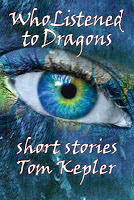 from Goodreads reviews by Pauline Ross, United Kingdom, used with permission Read from February 25 to 29, 2012 I don't often read short stories - I'm more into sprawling multi-volume works at the moment - but this is a good reminder of what I'm missing. A seemingly innocuous and gentle ramble, and then - wham, the kick in the tail. Like a fine whisky, it slips down oh so smoothly, and then sets you on fire.
from Goodreads reviews by Pauline Ross, United Kingdom, used with permission Read from February 25 to 29, 2012 I don't often read short stories - I'm more into sprawling multi-volume works at the moment - but this is a good reminder of what I'm missing. A seemingly innocuous and gentle ramble, and then - wham, the kick in the tail. Like a fine whisky, it slips down oh so smoothly, and then sets you on fire. These three stories from the author of the wonderful The Stone Dragon have the same timeless, classic simplicity of the novel, with an almost whimsical surface hiding something much more profound underneath. The longest of the three, after which the book is named, is a charming tale of family and differentness and the magic that lies therein and much more besides, because this is the kind of writing where you can take out of it as many layers as you want - every time you look, there's something more there. It's also the one with the biggest emotional kick at the end. The second story, 'River's Daughter', is beautiful even though I'm not at all sure I understood much of it. My favourite is the last, 'T'uk's Dilemma', which elegantly explains an intriguing quirk of the novel.
All are written in a lyrical style which would bear reading aloud, and both the first and third could easily work as bedtime fairytales for children (but perhaps not 'River's Daughter' - 'Mummy, Mummy, what does "urging the last of his seed to release" mean?'). And all of them share another quality with the novel: they silently work their way into your brain so that odd images and thoughts and layers of meaning hover around like smoke for days afterwards. Highly recommended.
Copyrights retained by the author, used with permission
Published on February 29, 2012 05:47
February 21, 2012
Choosing the Right Words
 "The difference between the right word and the almost right word is the difference between lightning and a lightning bug." Who can argue with Mark Twain?
"The difference between the right word and the almost right word is the difference between lightning and a lightning bug." Who can argue with Mark Twain?Choosing the right word is essential to good writing. Putting the right word on paper has its basis in knowing and thinking the right word. Just as it isn't productive to read something and not remember it, it also isn't productive to have a rich vocabulary and then to be so dull that the right words aren't available.
As a writer, investing in your consciousness is even more important than investing in a good dictionary. These two necessities are not exclusionary, of course. I've invested in the Transcendental Meditation Program and Webster's unabridged dictionary. It's also important to know that the best word is not always the longest. Sometimes the right word is very simple; sometimes a more complex word will distract.
Words should get across what you are trying to say in a "precise, meaningful, and natural way." According to the Northwest Regional Educational Laboratory (that promotes the 6-Traits + 1 writing program), "Striking words and phrases often catch the reader's eye and linger in the reader's mind." This is a wonderful description and example of choosing words that powerfully present an idea.
The effect of powerful word choice enhances both the definitive and emotional aspects of language: words have not only an intellectual meaning but also an emotional content. "Hundreds of words unsuitable to the atmosphere will prove futile against one word of value" is how Maharishi Mahesh Yogi described the power of choosing the lightning instead of the lightning bug power of a word.
Who you are has an important impact on word choice. Another value important to word choice is consideration of the audience and purpose of the writing. With consideration of the purpose of the writing, with sensitivity toward language as one writes, and with preparation for writing by being as wide awake within oneself as one can possibly be, then one writes...and rewrites.
Whatever is written can be rewritten. Whatever is drafted can be polished. The idea is conceptualized, manifests through the consciousness of the writer to the page, and then the writer can allow this child to meet the neighbors--other writers and users of language. In order to use the most effective words, a lively connection must exist between the writer's vision and the writer's sense of audience. Sometimes that "audience" can be a very focused group--maybe even your own self!--but other times, that audience broadens, and then the task of making the vision accessible to all becomes more significant.
I've heard of some writers who have a particular person they write to--maybe a cousin. This isn't such a bad idea. Using such a technique can have an effect on not just what words are chosen but also on how the words are joined into phrases and sentences. Our audience affects what we are writing about, the words and sentences we choose, and the voice with which we speak.
Don't have an audience? Then you are probably writing to the audience of . . . you! This is fine, I think, but if, at some point, you plan to share with someone besides yourself, then you have to look at what you've written with a more universal eye. Sixty seconds after I finish writing something, my first reaction is usually, " This is the greatest thing I've ever written!" Looking at it a month later as I prepare to revise for publication, I realize that initial enthusiasm is . . . over-enthusiastic.
The link between knowing yourself and knowing the right word to use is very direct. Perhaps that's why many writers have doubts. In all honesty, can we really paint the beauty of a sunrise with words? We can do our best to evoke someone's memories of the sun rising if we choose the right words, and with those words and the reader's imagination, maybe that's as good as we can do.
Can't think of the right word even though it's on the tip of your tongue? Maybe you'll get lucky and a friend will find that word for you. Like wild berries, words are already glistening in the meadows of our language, ripe for the picking. Make sure you don't sleep through the morning.
Copyright 2012 by Thomas L. Kepler, all rights reserved
Published on February 21, 2012 03:35
February 18, 2012
Don't Respond: Spam Can Be Dangerous
 Being uninformed and gullible can be dangerous.
Being uninformed and gullible can be dangerous.This is certainly true in both the physical world and also in the virtual world of the internet.
Below are a couple of examples related to internet naivete.
CONGRATULATIONS!! LIVERWOOD AWARD Committee, HAS GRANTED A HUGE SUM OF £1.5 MILLION BRITISH POUNDS TO YOUR EMAIL; For claims,If the "company" is contacted, you are then contacted by another "company" that states that you must first pay shipping, vat (value added tax), and insurance.
Send Name:
Contact Add:
Zip Code:
Phone #:
Age:
There are people gullible to fall for this. My research tells me this scam has been operating for a long time. Not all scams are so obvious, though--either in procedures or intent.
Some scams do not seek money but information. As a writer, I recently came across, through Google Alerts, the possibility that one of my e-books (or another publication that has the same title) was being offered as a free download by an overseas company. The only way to gain access to the free e-book was to sign up with the site: providing name and personal information.
Doing that, you can (from my research) download the e-book for free. However, the site now has your personal information. I searched for a contact address outside the "sign-up" box, but nothing was available. The site is a closed box unless you open it by providing personal information. Evidently, the site's main function is to gain information for identity theft. The fact that it actually provides a product disguises its real purpose.
The bottom line? Be sure to research a site before providing information. What is its reputation on the internet? What are others saying about the site or "company"?
You may save yourself a great deal of grief with a little caution and research.
Copyright 2012 by Thomas L. Kepler, all rights reserved
Published on February 18, 2012 03:45
February 16, 2012
Who Listened to Dragons, Three Stories Now Available
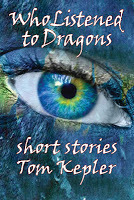 Who Listened to Dragons, Three Stories is now available as an e-book for $0.99 at Amazon Kindle and Smashwords. Because the e-book is on the Smashwords premium catalog, it will also soon be available at Kobo, Sony, the Diesel Bookstore, and at Barnes and Noble.
Who Listened to Dragons, Three Stories is now available as an e-book for $0.99 at Amazon Kindle and Smashwords. Because the e-book is on the Smashwords premium catalog, it will also soon be available at Kobo, Sony, the Diesel Bookstore, and at Barnes and Noble.I wrote four short stories over winter vacation from teaching, and writing these stories was a joy. "Filling in the map" of the Dragons of Blood and Stone series deepened my interest and understanding of the fantasy reality I've created. Writing these stories also gave me the insights I needed to begin rewriting the sequel to The Stone Dragon.
Set in the same reality as the fantasy novel The Stone Dragon, these three short stories continue the magic of the novel. Two brothers--one the strange one, the other the brother of the strange one, desert and wyrm, river's daughters or river nymphs, soldiers or assassins, retribution or abomination . . . Visit a land where magic makes all things are possible.
 "Who Listened to Dragons": "I was a young man who thought I knew the world and owned it—right up to the moment I opened my fist and found it empty." Two brothers live in the city of sands--one is the strange one, the other the brother of the strange one. Who can tell where magic ends and mystery begins when one can lose the world in a grain of sand or find wisdom in the whisperings of the wyrm?
"Who Listened to Dragons": "I was a young man who thought I knew the world and owned it—right up to the moment I opened my fist and found it empty." Two brothers live in the city of sands--one is the strange one, the other the brother of the strange one. Who can tell where magic ends and mystery begins when one can lose the world in a grain of sand or find wisdom in the whisperings of the wyrm?This short story was an interesting write because the two main characters are a twelve-year-old boy, who tells the story, and his six-year-old brother, who is autistic. Having the magician be a six-year-old autistic boy was a challenge that made writing the story exciting.
"River's Daughter": Those are three kinds of fish: those to throw back, those to keep, and those to toss on the river bank for the foxes. Is the same true for men? When a man comes to the cottage by the river, a sprig of columbine in his hat, how will the river's daughter choose?
A more adult story, "River's Daughter" was written with the tone of a legend. I took a character type from The Stone Dragon, a water naiad, and wrote a story about a naiad not in winter but in spring. Contained in a magical human body, how does this cosmic presence interact with the phenomenal world during the spring--and then I added a crone as a balancing element.
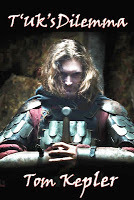 "T 'Uk's Dilemma": Kill Corinth: the job was simple. But who is the lady who meets him at the door? Who is he who stands before her—boy or man, soldier or assassin, retribution or abomination? And is it true that everyone deserves a second chance?
"T 'Uk's Dilemma": Kill Corinth: the job was simple. But who is the lady who meets him at the door? Who is he who stands before her—boy or man, soldier or assassin, retribution or abomination? And is it true that everyone deserves a second chance?This story also is inspired by events in The Stone Dragon, although it takes place prior to the storyline of the novel. A glimpse is provided of Knight's Landing, Madrone, and some background is provided for the Sisters of Hospitality.
These stories provide a varied introduction to The Stone Dragon and the Dragons of Blood and Stone series. I plan for the second novel of the series, Dragons of Blood and Stone, to be available before the end of 2012. Also planned is a collection of short stories, Tales of the Stone Dragon Inn, that will be out the following year. These short stories will be included in the collection.
Copyright 2012 by Thomas L. Kepler, all rights reserved
Published on February 16, 2012 03:26
February 12, 2012
Movie Review: The Help
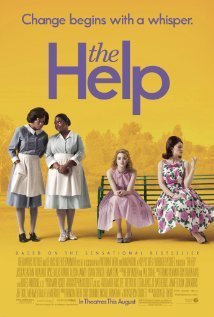 With four nominations for Academy Award Oscars and three of the top five awards at the recent Screen Actors' Guild (SAG) awards,
The Help
was a truly powerful, moving experience to view.
With four nominations for Academy Award Oscars and three of the top five awards at the recent Screen Actors' Guild (SAG) awards,
The Help
was a truly powerful, moving experience to view.Set in Mississippi during the civil rights era, the audience is confronted with the sweeping social issues of the times in juxtaposition with very private and personal versions of those same issues.
An aspiring author during the civil rights movement of the 1960s decides to write a book detailing the African-American maid's point of view on the white families for which they work, and the hardships they go through on a daily basis.(IMDb)Kathryn Stockett, who wrote the book from which the movie was adapted, is a Southern writer--and the movie reveals that "insider" secret knowledge.
Kathryn Stockett was born and raised in Jackson, Mississippi. After graduating from the University of Alabama with a degree in English and Creative Writing, she moved to New York City, where she worked in magazine publishing and marketing for nine years. The Help is her first novel. (Amazon Author Page)
 What we have is a story of change--women's roles, racial inequality and segregation, social pressure--and what was significant for me was the depth of change in character that the movie reveals. Not only the main characters but also minor are portrayed and their evolution expressed with great focus. Actresses Allison Janney and Sissy Spacek are two shining examples of portraying minor characters who provide dramatic and comic powerful moments to the movie that underscore the basic themes.
What we have is a story of change--women's roles, racial inequality and segregation, social pressure--and what was significant for me was the depth of change in character that the movie reveals. Not only the main characters but also minor are portrayed and their evolution expressed with great focus. Actresses Allison Janney and Sissy Spacek are two shining examples of portraying minor characters who provide dramatic and comic powerful moments to the movie that underscore the basic themes.The three central characters of the story, Skeeter Phelan (Emma Stone), a young college graduate and aspiring writer, and Abileen Clark (Viola Davis) and Minny Jackson (Octavia Spencer), maids who provide Skeeter with the "inside story," create an unexpected support group that nurtures the growth of each character.
This leads to a final point about the story. Men play a minor role in the story, portrayed as being in charge of the social structure and at the same time subservient to apparently powerless women who marry early, raise their children, and engage in questionable social club benefit events--and who actually "run the show." There is a human strength to the characters that transcends male or female roles, though.
Ultimately, the main characters (and some minor, too) see beyond color and class and gender, finding their common humanity and purpose. That's a powerful message--that being a good, powerful human being is an inner experience that cannot be judged by one's outer circumstances or position.
Copyright 2012 by Thomas L. Kepler, all rights reserved
Published on February 12, 2012 04:48
February 7, 2012
The Old Man and the Sea: Maharishi School Student "Book Report" Reactions
When writing about The Old Man and the Sea, there's more than one way to hook the reader's attention. Students at Maharishi School this quarter had asked for creative opportunities to respond to books read. Below are several reactions to Hemingway's novel by 10th grade students.
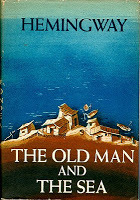 The Young Man and the Sea (a prequel)--by Surya S.
The Young Man and the Sea (a prequel)--by Surya S.
He had been sailing for many days and nights, alone on the dark sea. Nothing had even touched his line for the past few days, and the young man was wondering if this was truly the end. He should have listened to his old man mentor when he said that the sea was too rough. The old man had told him that he had once known someone to go eighty-four days without catching a single fish, but it was probably just a lie.
No one should be going a year without fish. He was the worst form of unlucky--stupid.
The man raised his line and drew in a piece of seaweed. His first catch of he day. The man rebaited his hook and threw it into the water. The sun was setting quickly, and the man knew that if he wouldn't catch anything now--then he would go to bed hungry for the third day.
The line was pulled slightly. Then again! The man sat slightly more forward over the stick that held the line from his boat. He tugged a little this way and that way until he was sure that he had something on the other end of his line.
Wow! I did it--my first catch of the year. This better be good, the man thought to himself. Patience, Timon, patience. Remember the story you were told about. The old man? Yes, he caught a big fish—and was at sea for many days. I must be like him! Timon slipped and accidentally tugged the line to hard. The line gave some lag, but all of a sudden it pulled back twice as hard, and Timon felt his boat slice through the waves.
What have I caught? Timon wrapped his hands around the rope--to keep the fish from taking too much lag—and started making an intricate series of knots with the other. No matter what he had caught, he would not let it go.
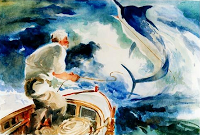 Santiago's Brother, Dearly Departed (an obituary)
Santiago's Brother, Dearly Departed (an obituary)
--by Girindra S.
Martin "Marley" Marlin has died. He was seven years old.
He was harpooned to death by an old fisherman in the Gulf Stream after pulling a fishing boat for almost three days. Martin was born on July 18th, 1944, off the coast of Cuba, to parents Rodrico and Aliala.
Martin was always a bit of a warrior. He grew up with no father, and his mother was a tuna addict. Martin left the school at only one and a half years old to go and live with Ernando, his uncle, and Sabrina, his aunt.
When Martin was just a little fish, he was confronted in the schoolyard by two sharks. He left that place with a few scars; the sharks left without fins. Martin never was one to give up on anything, especially a fight, so when the hook from the old man's line entered his mouth, he knew that he was going to be in it for the long haul.
He worked as the manager of the Mighty Mackerel, a sandwich shop on the lower east side. He loved his job, but his aspirations as a youngster were to be a gold-medalist in the Fish Olympics.
In his spare time, he volunteered at the homeless shelter, providing all of the fish there with free mackerel. He loved to know that he was making a difference and helping fish that were in need.
Martin will be succeeded by his daughter Francina, and wife Maria. All of his possessions will be given to them, as well as his house.
Martin was like a brother to many of us, and he will be truly missed.
A funeral service is being held at the town centre on August 4th.
I hope many of you can make it there to remember this great fish, father, brother, and friend.
Cod bless.

The Old Man and the Sea (an alternate ending)
--by Donovan S.
Santiago was panting; his heart racing. With the help of Manolin, he had just managed to kill the biggest fish he'd ever encountered. The two of them pulled the fish towards the skiff, not saying a word; they were too far in shock to speak. They cut some lines and tied the fish to the skiff.
Manolin finally broke the silence. "I knew it, you still have enough luck to catch this beauty," he smiled. "I think even the great DiMaggio would be impressed." That put a smile on Santiago's lips.
"Well, we're not back yet. I'm worried about the sharks that will be attracted. You can have the club, and I'll use the harpoon." With that said, the two set sail back towards home. They took shifts on who would watch for sharks while the other slept. This much-needed rest gave them the energy they needed to take on the waves of sharks that they encountered on their way back.
Little chunks of the fish had been stolen away by sharks that came from under the boat, but because of the rest they got, they were very quick in dispatching these. Santiago felt as if parts of himself were taken with the fish every time one of the detestable sharks managed to sneak a bite. It was a tough decision, but Santiago was glad that he decided to allow Manolin to come with him. The boy had pleaded, and Santiago couldn't stand to see him in that state. He knew now that he wouldn't have been able to make it this far with so little loss of the fish if it weren't for him.
"Thank you, boy," Santiago said as they reached the docks. Tears welling up in his eyes. He hadn't cried in front of the boy before. Manolin was also crying. When they finally reached the docks just before the crack of dawn, all the fisherman that were about to head out dropped everything they were doing and greeted them. Everyone was cheering. People helped the old man and the boy drag the fish out of the water. The old man, the boy, and about five fisherman helped to walk the fish over to the butcher. There they weighed it and gutted it.
This fish would set them up for life. "You can retire to Africa!" Manolin said with a smile on his face and tears of joy still flowing from his eyes. Santiago returned the smile and said, "You're coming with me. I'd get far too lonely with no one but lions to talk to."
This is how the story of The Old Man and the Lion began.
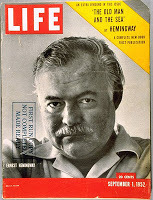 "Online Review": a one-of-a-kind book--by Michael C.
"Online Review": a one-of-a-kind book--by Michael C.
The Old Man and the Sea is a one of a kind book that completely deserved the Pulitzer and Nobel prizes that it was awarded. It communicates beautifully to readers what it means to be a noble human being as well as completely capturing the time and environment of the poorer coastal towns of Cuba in the 1950's.
The book begins in the first person of our main character, Santiago, a master fisherman who has devoted his entire life to fishing. Unfortunately, Santiago has become old and unlucky in his fishing, and has gone without catching a single fish for 84 days. This story is essentially about his journey on the 85th day of his fishing when he hooks a marlin bigger than his skiff. Throughout the course of the book, Santiago shows the reader that despite him not catching anything in 84 days, despite him being looked down upon by other fishermen, Santiago pursues his passion no matter what the outcome or accusations are. He is a fisherman, and no set of events could ever change that. So call him a failure, but this really illustrates to readers that Santiago displays the sort of determination and character that every human being should aspire to have.
Hemingway goes into great detail to his process of thinking as well as his determination as a fisherman and as a man. One of the greatest aspects of this book was Hemingway's ability to take such an insignificant situation and a seemingly insignificant man, and enlighten the reader that everything and everyone is significant, whether or not it's obvious at first.
I would highly recommend this book to all audiences; it's a quick, and simple read with a wonderful reminder that determination and confidence are the pathways to success.
Copyright 2012 by Thomas L. Kepler, all rights reservedPermission granted for student writing, all rights retained by the original authors
 The Young Man and the Sea (a prequel)--by Surya S.
The Young Man and the Sea (a prequel)--by Surya S.He had been sailing for many days and nights, alone on the dark sea. Nothing had even touched his line for the past few days, and the young man was wondering if this was truly the end. He should have listened to his old man mentor when he said that the sea was too rough. The old man had told him that he had once known someone to go eighty-four days without catching a single fish, but it was probably just a lie.
No one should be going a year without fish. He was the worst form of unlucky--stupid.
The man raised his line and drew in a piece of seaweed. His first catch of he day. The man rebaited his hook and threw it into the water. The sun was setting quickly, and the man knew that if he wouldn't catch anything now--then he would go to bed hungry for the third day.
The line was pulled slightly. Then again! The man sat slightly more forward over the stick that held the line from his boat. He tugged a little this way and that way until he was sure that he had something on the other end of his line.
Wow! I did it--my first catch of the year. This better be good, the man thought to himself. Patience, Timon, patience. Remember the story you were told about. The old man? Yes, he caught a big fish—and was at sea for many days. I must be like him! Timon slipped and accidentally tugged the line to hard. The line gave some lag, but all of a sudden it pulled back twice as hard, and Timon felt his boat slice through the waves.
What have I caught? Timon wrapped his hands around the rope--to keep the fish from taking too much lag—and started making an intricate series of knots with the other. No matter what he had caught, he would not let it go.
 Santiago's Brother, Dearly Departed (an obituary)
Santiago's Brother, Dearly Departed (an obituary)--by Girindra S.
Martin "Marley" Marlin has died. He was seven years old.
He was harpooned to death by an old fisherman in the Gulf Stream after pulling a fishing boat for almost three days. Martin was born on July 18th, 1944, off the coast of Cuba, to parents Rodrico and Aliala.
Martin was always a bit of a warrior. He grew up with no father, and his mother was a tuna addict. Martin left the school at only one and a half years old to go and live with Ernando, his uncle, and Sabrina, his aunt.
When Martin was just a little fish, he was confronted in the schoolyard by two sharks. He left that place with a few scars; the sharks left without fins. Martin never was one to give up on anything, especially a fight, so when the hook from the old man's line entered his mouth, he knew that he was going to be in it for the long haul.
He worked as the manager of the Mighty Mackerel, a sandwich shop on the lower east side. He loved his job, but his aspirations as a youngster were to be a gold-medalist in the Fish Olympics.
In his spare time, he volunteered at the homeless shelter, providing all of the fish there with free mackerel. He loved to know that he was making a difference and helping fish that were in need.
Martin will be succeeded by his daughter Francina, and wife Maria. All of his possessions will be given to them, as well as his house.
Martin was like a brother to many of us, and he will be truly missed.
A funeral service is being held at the town centre on August 4th.
I hope many of you can make it there to remember this great fish, father, brother, and friend.
Cod bless.

The Old Man and the Sea (an alternate ending)
--by Donovan S.
Santiago was panting; his heart racing. With the help of Manolin, he had just managed to kill the biggest fish he'd ever encountered. The two of them pulled the fish towards the skiff, not saying a word; they were too far in shock to speak. They cut some lines and tied the fish to the skiff.
Manolin finally broke the silence. "I knew it, you still have enough luck to catch this beauty," he smiled. "I think even the great DiMaggio would be impressed." That put a smile on Santiago's lips.
"Well, we're not back yet. I'm worried about the sharks that will be attracted. You can have the club, and I'll use the harpoon." With that said, the two set sail back towards home. They took shifts on who would watch for sharks while the other slept. This much-needed rest gave them the energy they needed to take on the waves of sharks that they encountered on their way back.
Little chunks of the fish had been stolen away by sharks that came from under the boat, but because of the rest they got, they were very quick in dispatching these. Santiago felt as if parts of himself were taken with the fish every time one of the detestable sharks managed to sneak a bite. It was a tough decision, but Santiago was glad that he decided to allow Manolin to come with him. The boy had pleaded, and Santiago couldn't stand to see him in that state. He knew now that he wouldn't have been able to make it this far with so little loss of the fish if it weren't for him.
"Thank you, boy," Santiago said as they reached the docks. Tears welling up in his eyes. He hadn't cried in front of the boy before. Manolin was also crying. When they finally reached the docks just before the crack of dawn, all the fisherman that were about to head out dropped everything they were doing and greeted them. Everyone was cheering. People helped the old man and the boy drag the fish out of the water. The old man, the boy, and about five fisherman helped to walk the fish over to the butcher. There they weighed it and gutted it.
This fish would set them up for life. "You can retire to Africa!" Manolin said with a smile on his face and tears of joy still flowing from his eyes. Santiago returned the smile and said, "You're coming with me. I'd get far too lonely with no one but lions to talk to."
This is how the story of The Old Man and the Lion began.
 "Online Review": a one-of-a-kind book--by Michael C.
"Online Review": a one-of-a-kind book--by Michael C.The Old Man and the Sea is a one of a kind book that completely deserved the Pulitzer and Nobel prizes that it was awarded. It communicates beautifully to readers what it means to be a noble human being as well as completely capturing the time and environment of the poorer coastal towns of Cuba in the 1950's.
The book begins in the first person of our main character, Santiago, a master fisherman who has devoted his entire life to fishing. Unfortunately, Santiago has become old and unlucky in his fishing, and has gone without catching a single fish for 84 days. This story is essentially about his journey on the 85th day of his fishing when he hooks a marlin bigger than his skiff. Throughout the course of the book, Santiago shows the reader that despite him not catching anything in 84 days, despite him being looked down upon by other fishermen, Santiago pursues his passion no matter what the outcome or accusations are. He is a fisherman, and no set of events could ever change that. So call him a failure, but this really illustrates to readers that Santiago displays the sort of determination and character that every human being should aspire to have.
Hemingway goes into great detail to his process of thinking as well as his determination as a fisherman and as a man. One of the greatest aspects of this book was Hemingway's ability to take such an insignificant situation and a seemingly insignificant man, and enlighten the reader that everything and everyone is significant, whether or not it's obvious at first.
I would highly recommend this book to all audiences; it's a quick, and simple read with a wonderful reminder that determination and confidence are the pathways to success.
Copyright 2012 by Thomas L. Kepler, all rights reservedPermission granted for student writing, all rights retained by the original authors
Published on February 07, 2012 03:00
February 4, 2012
Indian Country Today: Transcendental Meditation Combating Diabetes
 I just was introduced to a website that I found quite interesting: Indian Country Today Media Network.
I just was introduced to a website that I found quite interesting: Indian Country Today Media Network. My mother was adopted, and on her birth certificate for her birth father are the words "part Indian." How often I've wondered about that. How much of my genetic heritage is Native American Indian? What tribe?
Websites such as Indian Country Today provide resources for me to learn about my heritage in a contemporary, living context.
One interesting article I read was about diabetes and one way Native American Indians are dealing with it: Transcendental Meditation Combating Diabetes in Indian Country.
Ahmed Mohammed, medical director at the Winnebago Indian Hospital in Nebraska, estimates that up to 66 percent of the Winnebago served by the facility are either type 2 diabetic or pre-diabetic. He knows that the right diet and exercise can diminish diabetes symptoms but notes that stress is often the precipitating factor for those losing the battle with the disease. To change that, some tribal members began practicing TM.The article provides an overview of how some Indian communities are using the Transcendental Meditation program as a means of battling diabetes--and of the other benefits of the program, especially in school and in enlivening an interest in Native American spiritual heritage.
Shortly after his first trip to the Maharishi University of Management, Waukon [a member of the Winnegego Tribe] brought several elders to Fairfield to learn TM; the elders reported that in addition to lowering their blood glucose and blood pressure levels, they began to remember some of the traditional songs they had forgotten. "TM has helped them get in touch with the sacred again," he says.Below is a video where Prosper Waukon talks about the journey to health and wholeness his community is engaged in.
I am especially enthusiastic to see how suffering is being attacked from all sides. It is important to see that there are means to not just deal with a disease but to also find a way to move toward wellness and prevention.
Copyright 2012 by Thomas L. Kepler, all rights reserved
Published on February 04, 2012 04:26



